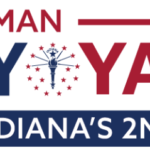 This week the Chicago-based Federal Appeals Court for the Seventh Circuit ruled against the City of Plymouth in the case of a U.S. Military Reserve officer’s lawsuit. Plymouth Police officer Robert DeLee had sought longevity pay under the Federal Uniformed Services Employment and Reemployment Act (USERRA).
This week the Chicago-based Federal Appeals Court for the Seventh Circuit ruled against the City of Plymouth in the case of a U.S. Military Reserve officer’s lawsuit. Plymouth Police officer Robert DeLee had sought longevity pay under the Federal Uniformed Services Employment and Reemployment Act (USERRA).
The appeal decision reversed the United States District Court for Northern District of Indiana’s March 31, 2014 entry of summary judgment in favor of Plymouth and remanded the case back to the district court for further action.
Sean Surrisi, Plymouth city attorney, said, “At this time, the city is reviewing the court’s opinion and evaluating the next steps in light of the decision.
It’s been over two years since Plymouth policeman DeLee filed a lawsuit against the City of Plymouth claiming that the City had failed to pay all of his longevity pay after he retuned from an eight-month tour in Afghanistan as a U.S. Air Force Reservist.
He holds the rank of Technical Sergeant.
Judge James Moody, United Sates District Court for the Northern District of Indiana, heard the case and entered a summary judgment on March, 2014 finding in favor of the City of Plymouth.
Briefs on a timely notice of appeal in the matter had been prepared on behalf of DeLee by Jocelyn Samuels, acting assistant attorney general, and Dennis Dimsey and Jodi Danis, attorneys with the Department of Justice, Civil Rights Division, Appellate Section, Washington, D. C. and the City of Plymouth by Sean Surrisi, attorney for the City of Plymouth. Both briefs are over 80 pages long.
DeLee alleged that Plymouth violated his employment rights under the Uniformed Services Employment and Reemployment Rights Act (USERRA) of 1994. USERRA is a federal law enacted in 1994 intended to protect civilian jobs and benefits for veterans and reserve troops who may be absent from their jobs during military service.
DeLee was on active duty with the Air Force between September, 2010 and May, 2011. He had been a patrolman with the Plymouth Police Department since April 19, 1999. After returning from the deployment, his position with the PPD was reinstated.
DeLee filed a USERRA complaint with the Veteran’s Employment and Training Services (VETS) of the Department of Labor (DOL) on or about January 31, 2012. When the matter could not be resolved between DeLee and the City, DeLee requested the Department of Justice (DOJ) representation to file the lawsuit alleging that the City violated USERRA by denying a benefit of employment he would have received, based on seniority, had he not been deployed.
Since 1989, the City of Plymouth has used longevity pay as an incentive to retain employees by paying $225 per year after the first three years for every continuous year that an emergency personnel (police and fireman) remains. The payment is made one time per year on or near the anniversary date of the employee.
When the City experienced financial difficulties in 1989, they enacted a second longevity pay ordinance pertaining to police, which prorates longevity pay for officers who take a leave of absence, including for military service.
In DeLee’s case, the city paid $900 for four months, but declined to pay $1,800 of longevity pay for the time he was on a leave of absence.
The City contended that their ordinance includes language that means longevity pay shall be prorated during the year immediately preceding their anniversary date when an employee is on a leave of absence. It also includes the following: “Longevity pay shall be prorated as based on the number of months of actual active duty during the year immediately preceding the anniversary date.”













